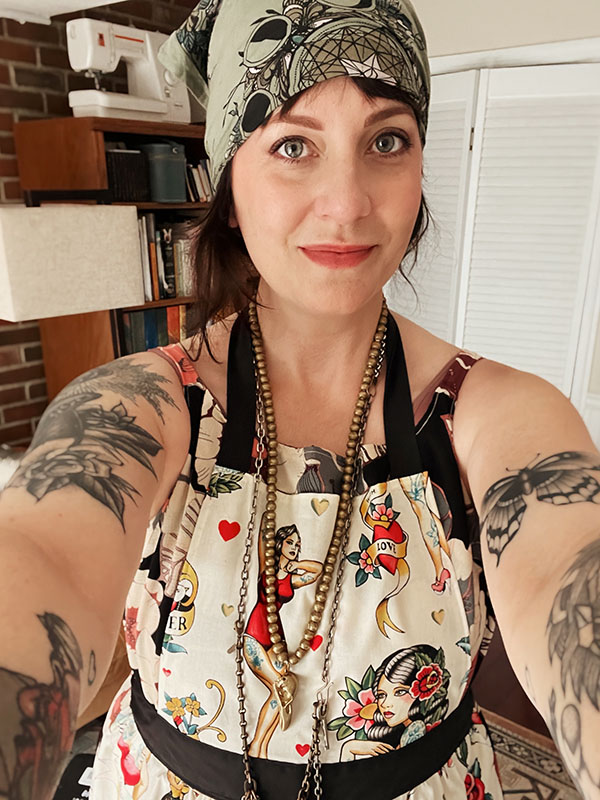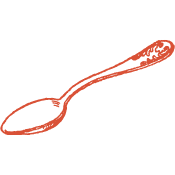If you’re always exhausted, in pain, and dissociated from the world around you, you might be a spoonie. And you’re not alone.
Today, I’m almost out of spoons. So here’s a photo of me from Thanksgiving—a “plenty-of-spoons” day.

I wanted to infuse my kitchen with GOOD ENERGY, so I wore my handmade apron from 42 Therapies and one of my beautiful Lakhays bandanas to hold my hair back—and guess what? Our meal was AMAZINGGG! (Definitely because I was feeling wonderful.)
But let me back up a little. Do you know that phrase? “Out of spoons”?
Or maybe you’ve heard people call themselves “spoonies”?
(It’s not the same as being “spoony,” an adjective which means “silly.”)
*Spoonie* is a noun, and folks with chronic illness use it.
Spoon Theory was created by a woman named Christine Miserandino, who used spoons to represent units of energy—the energy we expend throughout the day doing the simplest of things.
Getting out of bed.
Taking a shower.
Eating breakfast.
Getting dressed.

Chronic physical and mental illness exhausts the body, which leaves spoonies with limited resources for the rest of life. Out of necessity, we spoonies must acknowledge that we only have this many spoons available to us at any given time, which means we’re forced to make tough decisions about how we’ll use those spoons.
I think this is true for EVERYONE, though.
Some folks are simply born with more spoons than others.
Lucky folks have spoons that are better-made and longer-lasting. Others seem to have unlimited spoons, even—spoons that repopulate like adorable bunnies.
When you’re constantly ill, however, you begin each day with fewer spoons than most, because chronic illness has a cost.
Pushing through and surviving costs spoons.
Depression and anxiety rob us of spoons. Physical pain steals spoons. Masking a neurodivergency is spoon-expensive. Traumas like death and divorce are spoon-eaters. Kids and pets and jobs snatch spoons from us.
And when every single thing you do costs a spoon, you realize very quickly that you need to stay on top of your spoon distribution.
I had one small glass of white wine yesterday at my husband’s holiday gathering for work—and it cost me all my remaining spoons.
The drive home was physically painful: the headlights of other cars, the potholes leftover from last winter, the awkward curve of the headrest…
I went to bed as soon as we got home. It was 6:30pm, and I didn’t wake up until 1:30pm the next day.

That’s 19 hours of my life. Time I’d wanted to spend on a virtual coffee date with a friend. It included time I’d planned to invest into writing for a client. Time I thought I’d get to share with my husband and our sweet pup Leia.
And I have a lot more spoons than many people.
Some folks wouldn’t have even made it to the party. There are plenty of people who never have the energy to write, or read, or cook a Thanksgiving meal.
When you wake up every day with limited spoons, you make tough decisions. Decisions that some people call “selfish.” What they don’t understand is that it’s not really a choice. You’re in survival mode, 24/7.
Are you a spoonie?
Sometimes? All the time?
Maybe you started life as a spoonie. Or maybe you lost spoons to a later diagnosis or tragedy. Maybe you have weeks of no spoons contrasted with weeks of all the spoons.
Those spoonless periods sure can make the spoon-full times disappear from memory, can’t they?
To be clear: this isn’t a plea for sympathy.
It’s just an educational tidbit—and a reminder that it’s GOOD and WISE to stay aware of how many spoons you have at any given time. It’s okay to say no to some things so you can say yes to others.

Never apologize for needing to ration your spoons.
That’s how you make it, day after day.
If Spoon Theory resonates with you, seek out other spoonies.
Spoonie friends help me feel normal. They remind me that I’m not just being dramatic. Their stories reassure me that I’m not selfish when I choose sleep over adventure, or stillness over activity, or prescription medication over natural remedies.
Go ahead and peek out from under your covers.
You’re not the only one who feels this way.
Spoonies are everywhere: at the messy desk next to yours at work, in the grocery store analyzing the ingredients labels, in the car pool line snagging a quick nap, and on social media seeking support.
Come say hi.
You’ll know us by our spoons.
Header photo by Raul Angel
